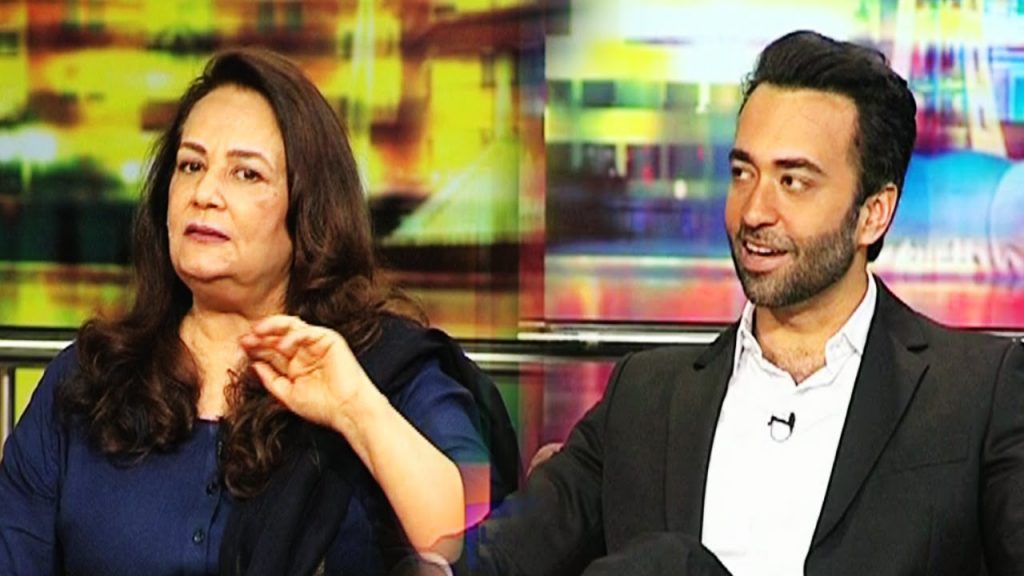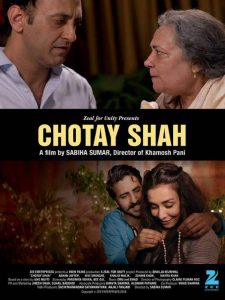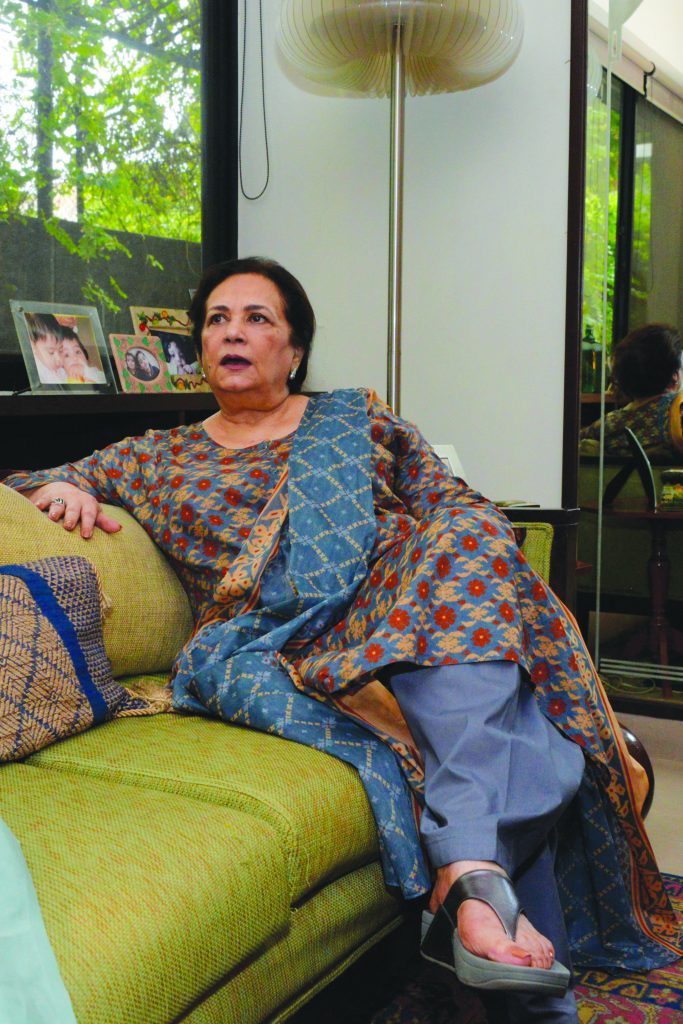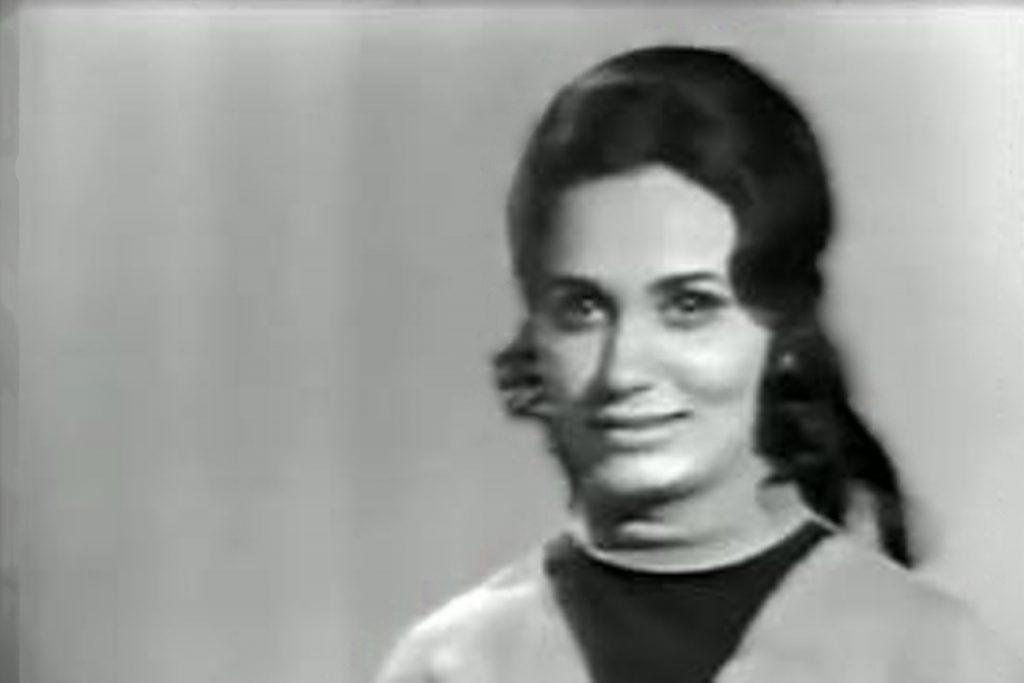“People have ceased to think” – Navid Shahzad
By Ally Adnan | Interview | Published 9 years ago
The woman behind some of Tal Matol and Such Gup immortal characters, Navid Shahzad is a woman of many parts. Educationist, mediaperson and accomplished actor, she takes a trip down memory lane with Ally Adnan in this exclusive interview for Newsline.
You look as beautiful today as you did when I first met you in the early seventies.
Thank you for the compliment. I believe that people who are happy and content with their lives tend to feel and look good. Satisfaction and gratitude add a glow to one’s face. I also think that one should not fight the aging process. Everyone ages. It is a natural phenomenon. I think the face is a map of the story of one’s life. Every wrinkle, every spot, has a tale to tell — an interesting tale. Aging adds character to the face. It makes it more interesting and, if you will, beautiful.
You fell in love with cricket commentator Shahzad Humayun while studying in Government College, Lahore and later married him. Was it a happy marriage?
Yes, it was. It was based on respect, honesty and trust. We had different personalities but shared the same values and a lot of the same interests. We had great friends and relished our friendships. We loved reading books and had a great interest in the performing arts. Shahzad had the most amazing voice. My son, Farhad Humayun, has inherited his singing talent from his father.
He was a very generous man — and not just with money. Time, attention, love and care, he would give it all to his friends and family. I have never met a more generous person in my life.
Shahzad was also a very handsome man, whose work kept him away from home for long periods of time. Were you ever concerned that his eyes would roam?
No, never. People used to ask me why I never seemed worried when he was gone for long periods of time. I would always tell them that I was not concerned because of the trust I had in him. The trust was mutual. He was a very handsome man and, yes, he had access to a large number of very attractive ladies during his travels but I was a very pretty woman as well. I had a lot of good-looking male friends and men who admired me, as well. He trusted me the same way I trusted him. That is the reason things worked as well as they did between the two of us.
He passed away six years ago. Has time healed the wounds of loss?
No, things do not necessarily improve as time passes. Time heals some wounds, while it opens up new ones. I miss him as much today as I did when he passed away.
How do you deal with the loss?
I find a great emotional outlet in writing. I write poems in Urdu, English and Punjabi, and essays about my husband. Presently, I am writing a long letter to him. Writing is important not only because it helps me deal with the loss but also because it documents our life together. Parents seldom talk about each other with their children, except, perhaps, when they are complaining. I want my children to know their father as I did and appreciate the bond that I enjoyed with him.
You have made a name for yourself as an educationist, performer, writer, administrator and a lot else. What made you excel in so many fields?
It was, without a doubt, my upbringing. My father was a visionary who provided us an environment where learning, reflecting and thinking was encouraged. Academic achievement and scholarship were very important in the household. Culture, history and the arts were valued. The most talented and learned of people used to visit our home; people like Abdur Rahman Chughtai, Ahmed Nadeem Qasmi, Ashfaq Ahmed, Noor Jehan, Farida Khanum and Imtiaz Ali Taj. I think their influence helped shape me, my intellect and my interests.
All the people you mentioned were known for their ability to make good, intelligent conversation. However, with time the art of conversation seems to have all but vanished.
People have ceased to think. They access information on the web, they travel the world and they read but they never take to time to understand, reflect and think. They have filled their life with so much noise that they cannot hear their own inner voice. They have denied themselves the luxury of taking breaks to study, contemplate and ponder. As a result, they are unable to make anything but the most superficial of conversation.
Your father, the late Justice S. A. Rehman, did not have a lot of money. Your husband was financially comfortable but had to deal with some serious financial hardships caused by business problems. Nevertheless, you always maintained a façade of financial well-being.
Yes, that is true. Our family had an unwritten rule of never discussing private domestic matters with anyone outside the family. It was not acceptable to share financial problems, or any other issue for that matter, with outsiders. My father had a fixed, rather modest, income. All of us used to sleep together in the one air-conditioned room in the house. We would get excited when chicken was cooked for a meal. I used to happily wear my mother’s old clothes. There were times when we were really short of money. But none of this ever bothered me because I did not care much for material things, certainly not to the extent that I would discuss it with someone. There were better things to talk about.
Noor Jehan used to visit both you and your father. What did you think of her?
Noor Jehan was an extraordinary woman. She was strong, resilient, powerful, ambitious and determined. She reminded me of Cleopatra. They were both intensely passionate women who could shake the foundations of huge empires. Noor Jehan held her own in a man’s world. In a society where women have been victimised traditionally, she turned the tables, making men the victims of her desires. When she found a man attractive, she went after him like a predator. A truly remarkable woman.
Noor Jehan could also be very funny. I once asked her the secret of her glowing complexion and she responded by asking me if I enjoyed eating raw butter. When I told her that I did not, she said, “in that case, there is no hope for you. You need to eat a lot of butter to have skin like mine.”
One of your friends, Shahida Nayyar, married Ejaz, the love of her life, after he ended his relationship with Firdaus.
Noor Jehan’s love for Ejaz Durrani was undying. She was devastated when he left her for Firdaus. She was obsessive about him and continued to care for him till the very end.
How is it that a man as unremarkable as Ejaz was able to attract so many remarkable women?
Love is blind. It really is. Ejaz has no substance and no spark. There is no rationale for the love women have had for him.
You became famous with the comedy television shows, Such Gup and Tal Matol, in the seventies. Why were the shows so successful?
Shoaib Hashmi’s writing was excellent. It had the right blend of humour, satire and wit. The camaraderie between the team was remarkable. All of us were willing to do whatever was needed to make the show successful. We worked long and hard — and with a commitment bordering on insanity. The results of our collective hard work were great.
We were intrigued and enchanted by the medium of television and the opportunities it provided for performance.
 Such Gup and Tal Matol have been criticised for borrowing heavily from Rowan & Martin’s Laugh-In. Is the criticism fair?
Such Gup and Tal Matol have been criticised for borrowing heavily from Rowan & Martin’s Laugh-In. Is the criticism fair?
No, it is grossly unfair. I became involved with the programmes when they were being conceived. I know how the recurring characters were defined and developed. None of them were borrowed from Laugh-In or any other programme. The two programmes were completely original.
Your performance in PTV’s long play about a lonely, elderly couple, Daur-e-Junoon, earned you a lot of praise.
It was a good play. Qavi and I rehearsed for the play for a whole month. When the recording of Daur-e-Junoon started, we were so well-prepared that the entire shooting took about two hours.
In spite of, almost always, being recognised for your work, you did very little for television. Why were you so picky?
I was not as picky as people think I was. I wanted to do more television, but I was rarely offered roles that I found interesting. After Daur-e-Junoon, all the offers I got were for playing old women. I was in my thirties at the time and did not want to always play the old lady. After Ghulam Gardish, everyone wanted me to play the matriarch. I did not want to be typecast and turned down many offers to play characters similar to ones I had already played. Over the years, I got to be known as a “difficult person” because I would refuse to do roles that I did not find challenging.
Talking of being a “difficult person,” you were unhappy during your 30 years at the Punjab University and five at the Pakistan School of Fashion Design. After working at the Beaconhouse National University for 10 years, you left that institution on a sour note as well. Are you really a “difficult person?”
I do not think I am a difficult person at all. I lead a principled life and do not like to compromise on my principles. It is possible some people view that as a sign of me being difficult.
It is difficult for anyone to be happy at the Punjab University. There is far too much politics there. I was unhappy as principal at the Pakistan School of Fashion Design because of the bureaucracy and the level of interference from the government. I helped set things up at the Beaconhouse National University and worked there for 10 years. It was not an easy 10 years. A lot of people tried to exercise their influence at the institution. I had policy differences. When Sartaj Aziz became the vice chancellor, things became very difficult. He had a background in finance and not the arts or education. He started questioning each and every expense and made working at the university very frustrating. It came to a point where I got tired of fighting. Shahzad had also fallen ill by that time. So I quit the institution and took a break of one year from work.
 You currently work as the academic advisor at the Lahore Grammar School. What is the nature of your work?
You currently work as the academic advisor at the Lahore Grammar School. What is the nature of your work?
I train teachers. I teach when I want to teach. I conduct seminars on education. I organise events. I help develop curricula. I do a lot of interesting work at the Lahore Grammar School. I am enjoying my time at the school.
You completed work in Sabiha Sumar’s film Chotay Shah last year, but the film has not been released as yet?
Chotay Shah is currently being shown at festivals. I believe it will be released later on in the year.
Do you plan to act in the future?
Yes, I do. I recently signed on to do a film for Humayun Saeed. Shooting is scheduled to begin in the fall. I want to act — I really do — but I need good roles. Otherwise, there is no point in acting.




